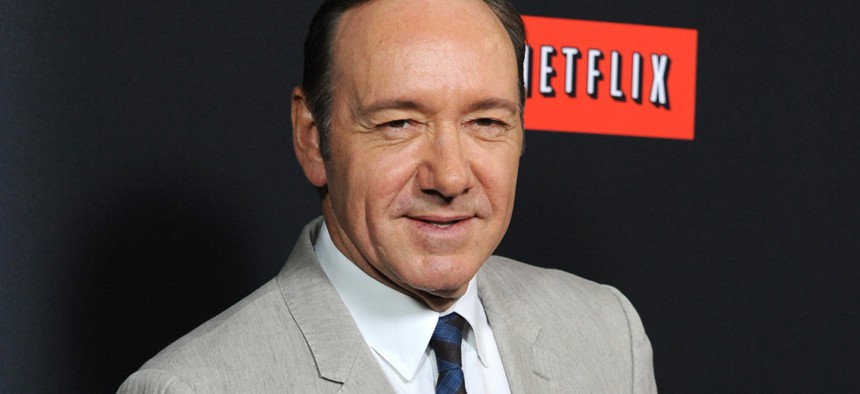Netflix's Net-Neutrality Plea Gets Rejected by the FCC

Kevin Spacey stars in the Netflix original series House of Cards. Jaguar PS/Shutterstock.com
The government has a critical role in how networks connect to each other, it's just not a net neutrality issue, FCC chair says.
The Federal Communications Commission has no plans to expand its net-neutrality rules to ensure that services like Netflix can connect to Internet providers' networks for free.
But the agency is eyeing other avenues to regulate special deals between websites and Internet providers—an area of concern for consumer groups after Netflix paid Comcast for better access to its customers.
At a press conference Monday, FCC Chairman Tom Wheeler argued that the government has a critical role to play in overseeing how networks connect to each other. But it is "not a net-neutrality issue," he said.
Asked to clarify the chairman's comment, an FCC spokesman said: "Peering and interconnection are not under consideration in the Open Internet proceeding, but we are monitoring the issues involved to see if any action is needed in any other context."
The statements appear to reject the recent plea from Netflix CEO Reed Hastings to expand the FCC's Open Internet Order (better known as the net-neutrality rules) to cover interconnection deals.
But the FCC could decide to enact separate regulations on the issue or force Comcast to accept new rules in order to receive permission to buy Time Warner Cable.
Web companies have negotiated connection agreements since the creation of the Internet. Most websites connect to intermediaries, who carry the traffic to Internet service providers, who deliver the content to people's homes. But it was an arcane issue that attracted little public attention until February, when Netflix agreed to pay Comcast to connect directly to its network.
The agreement helped to ensure that Comcast subscribers can stream Netflix videos smoothly, with less buffering time and fewer interruptions. But it was the first time that Netflix had ever had to pay an Internet service provider for a direct connection deal.
In a blog post in March, Netflix's chief executive suggested that Comcast had strong-armed him into paying an "arbitrary tax."
"If this kind of leverage is effective against Netflix, which is pretty large, imagine the plight of smaller services today and in the future," Hastings said.
He warned that the deal foreshadows a future of high-stakes negotiations between websites and Internet providers that will result in escalating costs for consumers. When the negotiations break down, consumers will lose access to popular sites, he claimed.
"Some big [Internet service providers] are extracting a toll because they can—they effectively control access to millions of consumers and are willing to sacrifice the interests of their own customers to press Netflix and others to pay," he wrote.
Hastings urged the federal government to enact "strong net-neutrality" rules that bar Internet providers from charging a toll for direct access to their networks.
In an interview on C-SPAN over the weekend, David Cohen, Comcast's executive vice president, said Hasting's arguments are "essentially hogwash." He claimed Netflix was the one that pushed for the deal and noted that the video site alone accounts for about 30 percent of all Internet traffic.
Cohen said he expects the FCC to scrutinize paid connection deals, but that this is "not an area where government intervention is useful or necessary."
The FCC's original net-neutrality rules, enacted in 2010, required Internet service providers to treat all Internet traffic equally. A company like Comcast could not slow down or block a website. But the rules did not affect how Internet networks connect to each other.
By agreeing to give Netflix direct access to its network, Comcast helped to ensure higher quality video service, but it did not technically give preferential treatment to Netflix traffic as it flowed into subscribers' homes.
The FCC is reworking its net-neutrality rules because a federal court struck down the old version earlier this year.
(Kevin Spacey image via Jaguar PS / Shutterstock.com)






